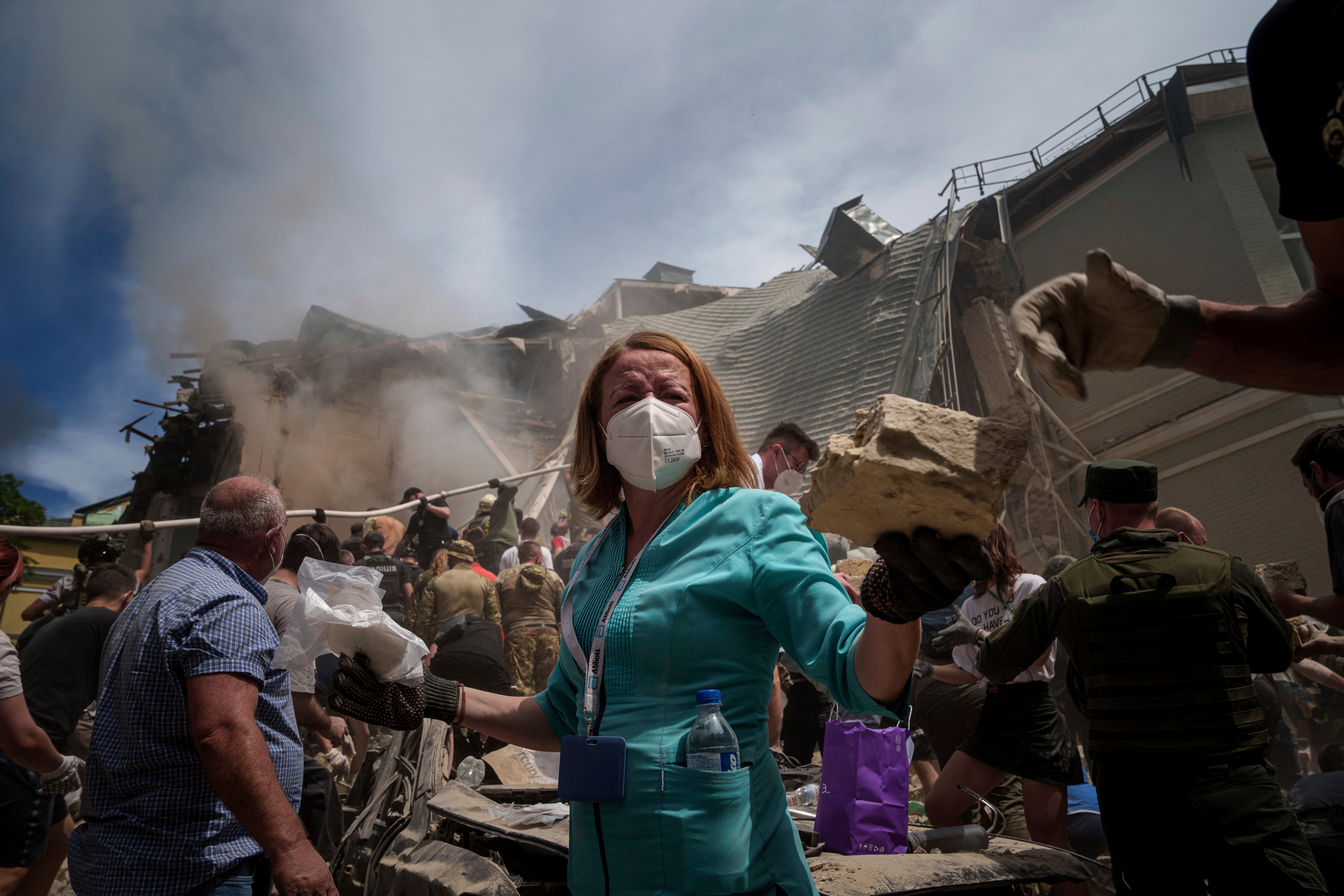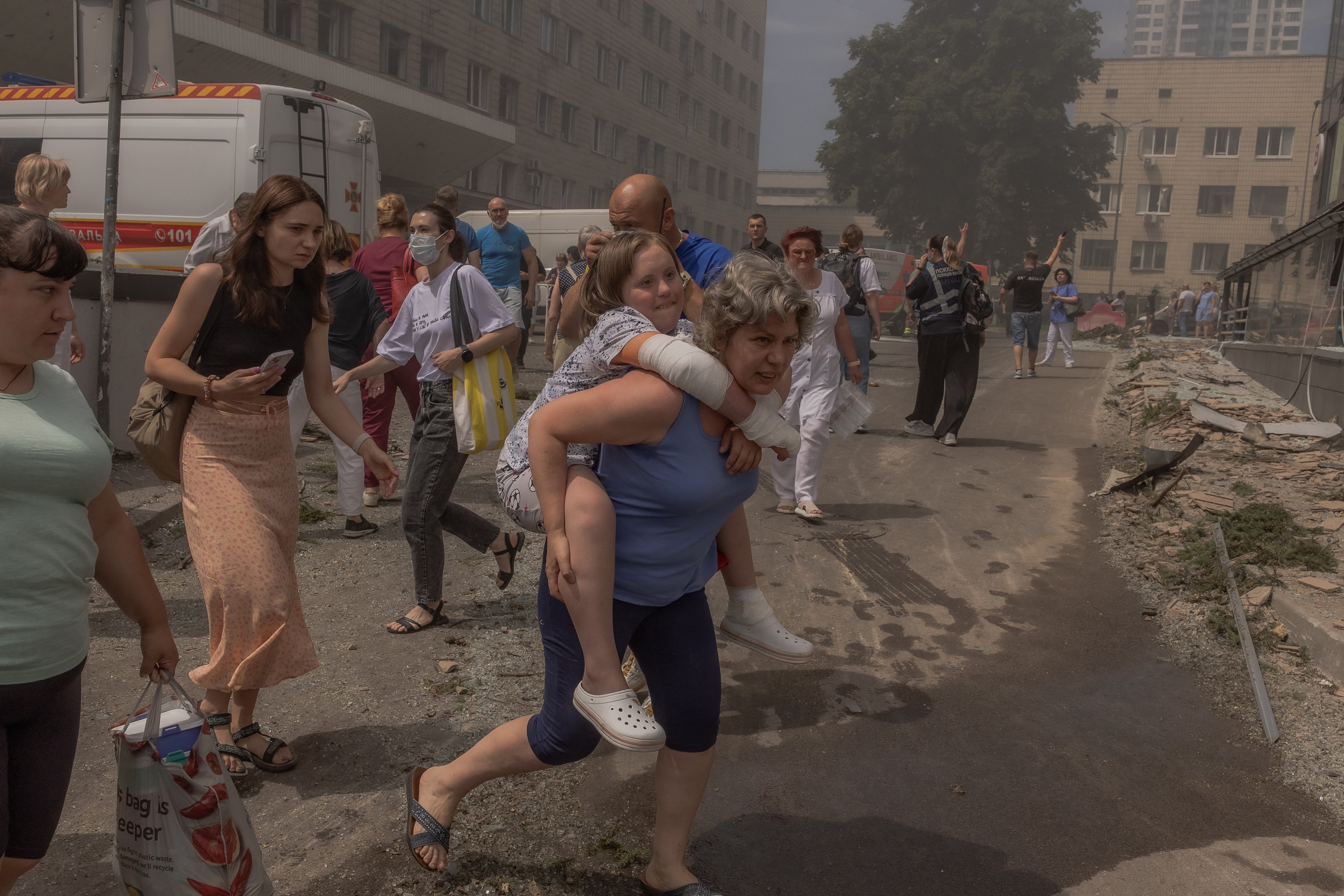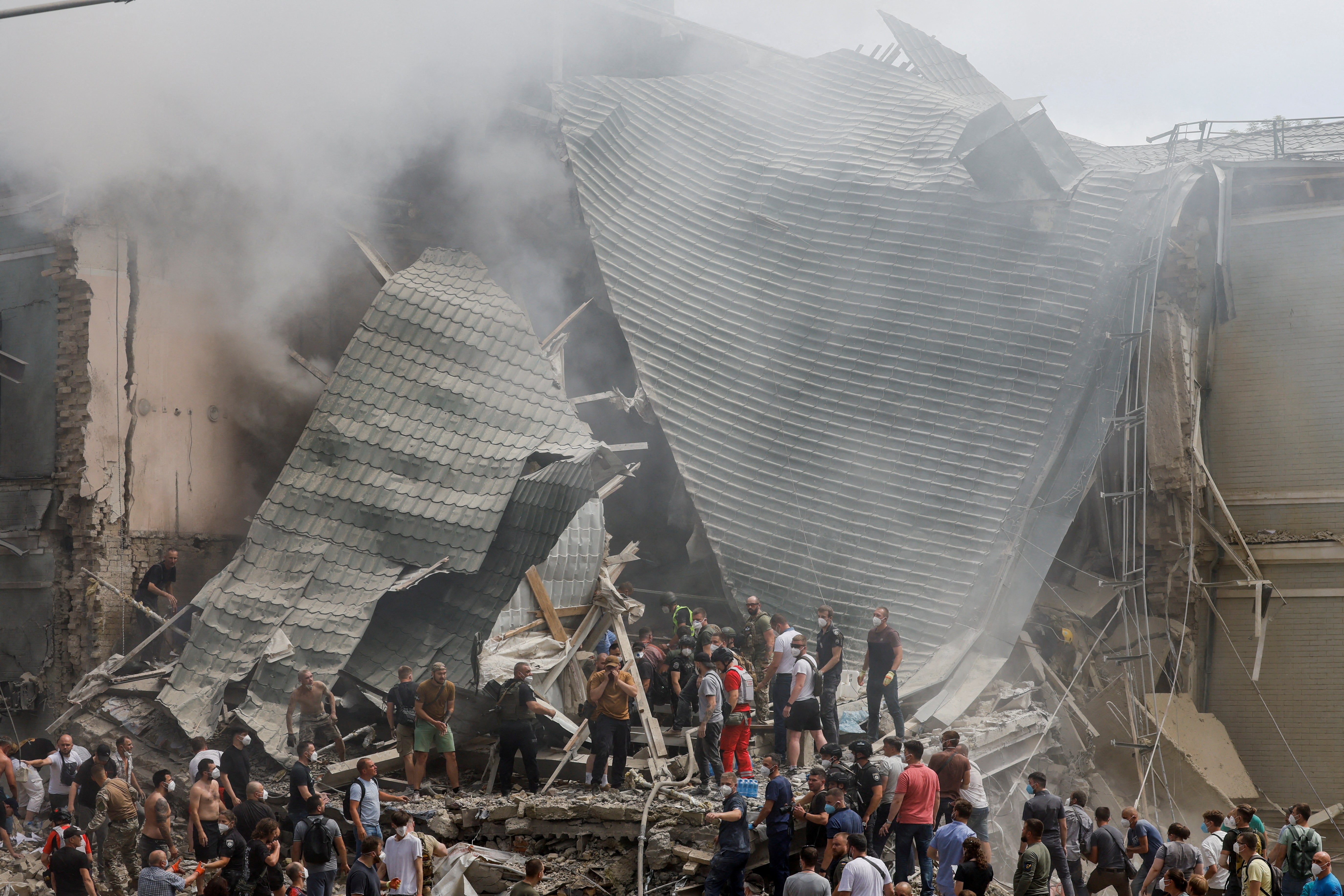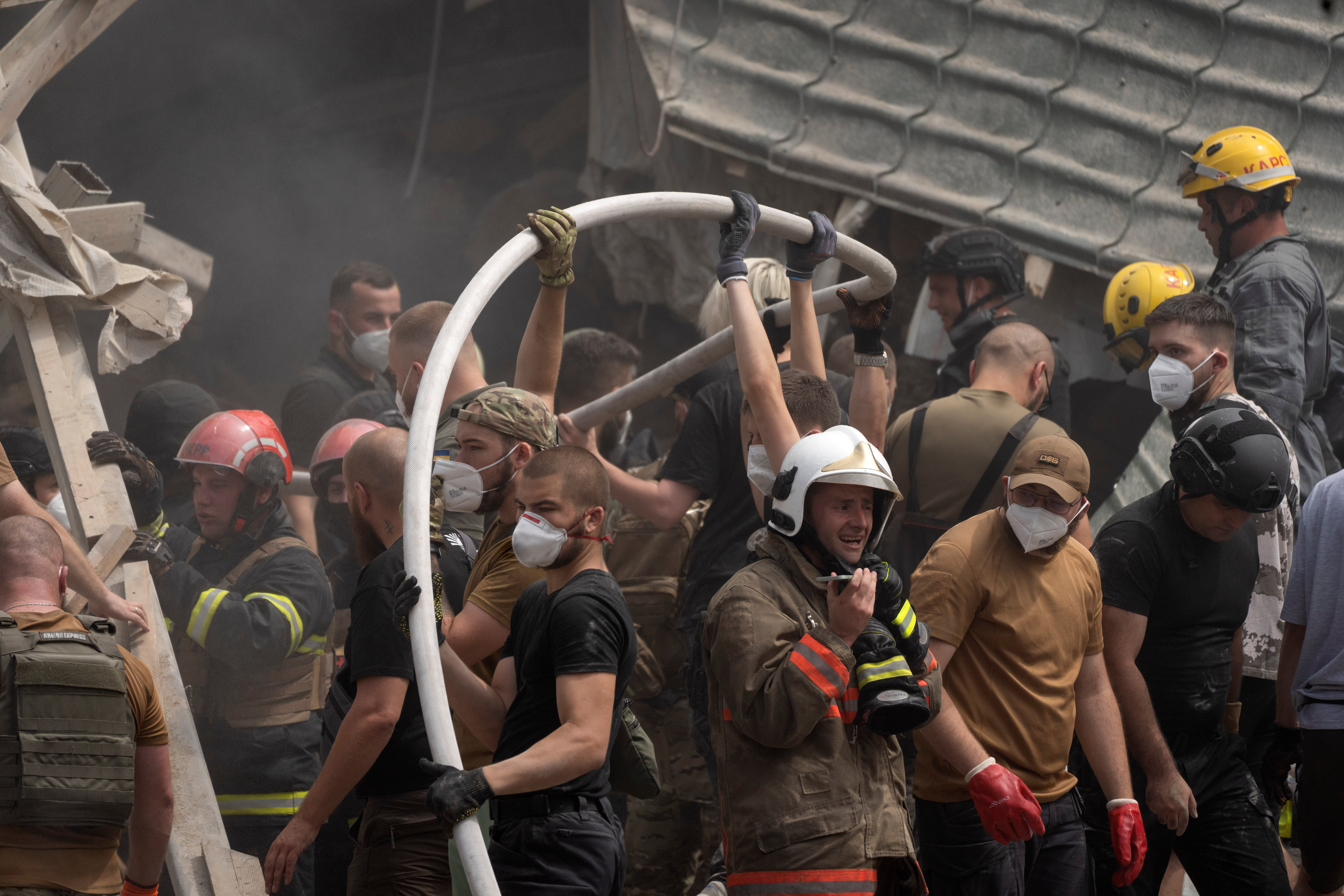‘The whole room was covered in blood’: Inside the Russian missile strike on a Kyiv children’s hospital
Warning, distressing content: A mother who was waiting with her eight-year-old daughter for surgery in the Okhmatdyt children’s hospital in central Kyiv tells Tom Watling of her terrifying experience as Russia fired multiple missiles at the complex
Your support helps us to tell the story
From reproductive rights to climate change to Big Tech, The Independent is on the ground when the story is developing. Whether it's investigating the financials of Elon Musk's pro-Trump PAC or producing our latest documentary, 'The A Word', which shines a light on the American women fighting for reproductive rights, we know how important it is to parse out the facts from the messaging.
At such a critical moment in US history, we need reporters on the ground. Your donation allows us to keep sending journalists to speak to both sides of the story.
The Independent is trusted by Americans across the entire political spectrum. And unlike many other quality news outlets, we choose not to lock Americans out of our reporting and analysis with paywalls. We believe quality journalism should be available to everyone, paid for by those who can afford it.
Your support makes all the difference.Olena Danylova and her eight-year-old daughter watched as black smoke started to seep through the ceiling into the bomb shelter where they had just fled a Russian missile attack.
Moments earlier, her young daughter, who she asked not to be named, had been preparing to have hernia surgery at the Okhmatdyt children’s hospital in central Kyiv.
The doctor had been preparing her for the operation on the fifth floor; the surgery was to take place on the seventh floor. She was next in line for an operation.
Then they heard the first explosions, somewhere in the distance. The three of them – mother, daughter, doctor – stopped in their tracks. All three knew full well that the most dangerous place to be during a missile attack is high-up.
“Then we heard another explosion, a bigger one … and we ran as fast as we could down to the bunker,” she said.
When they got down to the shelter – dozens of children and parents in front and behind them – they tried to stay calm. But the reality of what was happening was terrifying.

The two bombs, believed to be Russian Kh-101 cruise missiles, had hit nearby buildings, but one of the explosions had blown out the windows of the operating floors on the sixth and seventh levels of their building, sending shards of glass hurtling towards the patients and surgeons. Olena’s daughter had been just moments away from heading to surgery.
“The kid that was before my daughter was in the middle of the operation when the bomb hit, so they had to stop and wake him up, and then run to the shelter,” she said. “They told us the whole room was covered in blood.”
And then there was a loud bang and everything went black. A third missile had landed directly on their building.
The fire alarm started screeching. The children started crying. Black smoke started to seep into the shelter.

The mother and daughter paced from one end of the shelter to the other, wondering whether to risk inhaling smoke or going outside and possibly being hit by a Russian double-tap, a frequently used tactic by Kremlin forces which involves firing a second, third or even fourth missile at a single site after emergency workers have already rushed to the scene. Her daughter “kept asking ‘what is happening now’ over and over again”.
With the smoke thickening, Olena decided they had to leave the shelter. “I was just in the mode of a robot. I had to do what I had to do; I had to save my child; I had to make sure we were heading into safety.
“When we came out, there were a lot of people, kids, with all kinds of injuries. Some of them were red from the surgeries, mothers were holding them and covering them with blankets.
“It was very chaotic. Nobody knew what to do. Everything was covered with broken glass and fallen windows. We were trying just not to fall into panic. But we saw a lot of smoke coming from the buildings. We heard firemen approaching.”

Olena and her daughter had been caught up in one of Russia’s most prolific attacks since Vladimir Putin ordered the full-scale invasion of Ukraine in February 2022. At least 29 people were killed across Kyiv, with at least three hospitals damaged on both sides of the Dnipro river that divides the city. A doctor was among the two killed at Okhmatdyt, while children were among those killed elsewhere in the city.
The president’s office said the rockets completely destroyed the toxicology building of the Okhmatdyt complex and damaged four more departments. An initiative to raise 100 million hryvnias (£1.9m) for the hospital has already been set up.
Additional attacks on Ukrainian president Volodymyr Zelensky’s hometown in Kryvyi Rih about 400km (250 miles) to the south killed at least 10, while attacks in the more easterly city of Pokrovsk in Donetsk region killed three. More than 190 people were injured.
A spokesperson for the Ukrainian branch of the United Nations’ human rights commissioner, whose office is located nearby the Okhmatdyt hospital, described it as “really one of the worst attacks I have experienced during my time here”.

Ukrainian officials labelled the attack genocide. US president Joe Biden called it a “a horrific reminder of Russia’s brutality”. Russia, meanwhile, made false claims that the destruction wrought upon the children’s hospital was the result of a misfired Ukrainian air defence missile, an allegation that the UN has said is highly unlikely.
Video has already emerged appearing to show what appears to be a Russian warhead flying towards the hospital seconds before the explosion.
Ukraine’s key allies sat down for the first of a three-day Nato summit in the US on Tuesday evening still reeling from the violence of an attack that seems for all intents and purposes to have been aimed at civilians.
“Putin sends his greetings to the Nato summit by bombing a childrens’ hospital,” wrote Lithuanian foreign minister Gabrielius Landsbergis. “As if any clarification was needed as to why Ukraine must have all possible support now, and real guarantees for security in the future.”
When Olena and her daughter finally returned home on Monday, she said they took some sedatives, collapsed onto their beds and “tried to get ourselves together”.
The doctor called her later on. “Of course you know the surgery has to be postponed indefinitely,” he told her.
No matter, she thought, her daughter sleeping soundly in the next door room.

Join our commenting forum
Join thought-provoking conversations, follow other Independent readers and see their replies
Comments